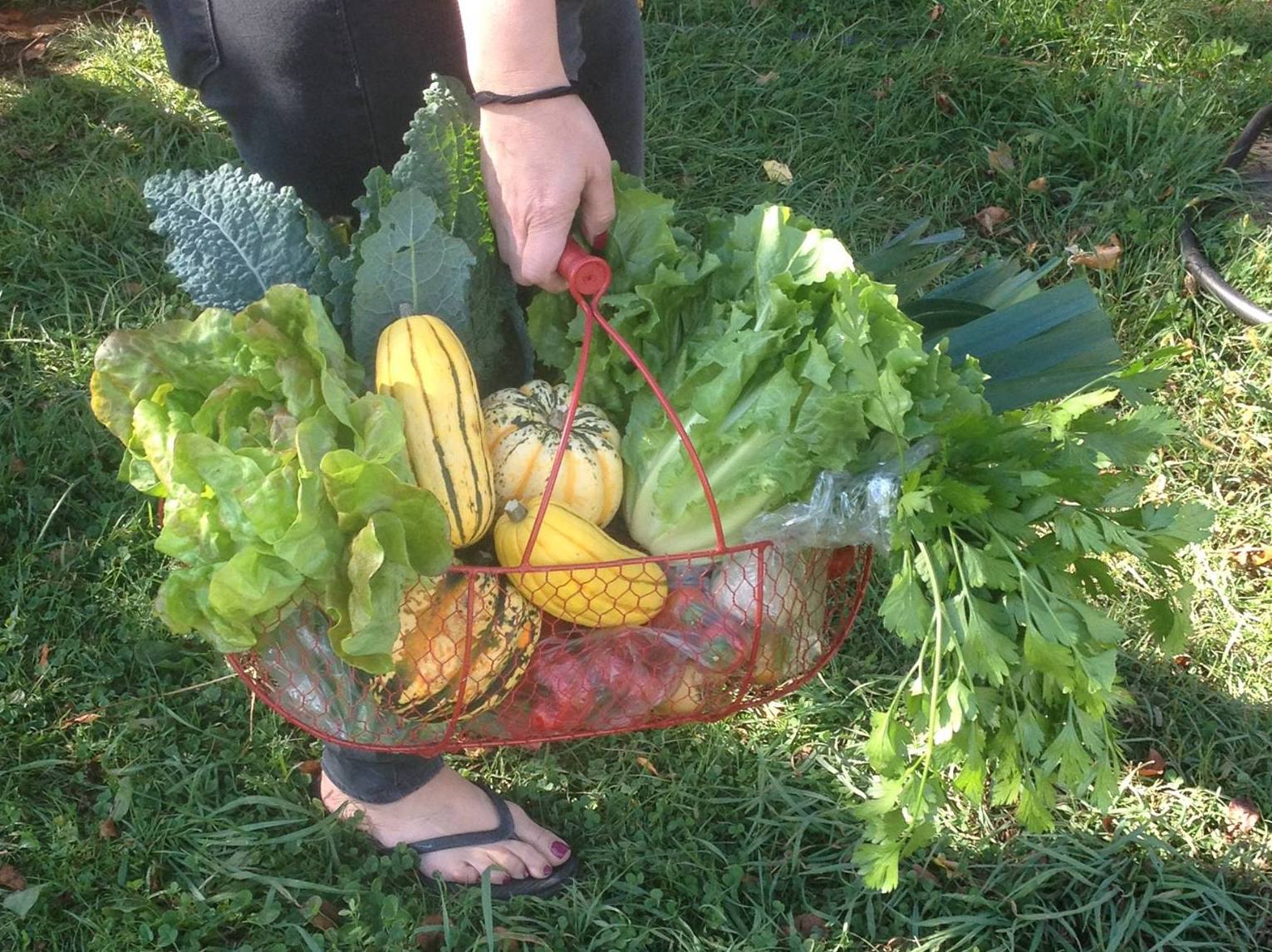

Produce from the community supported agriculture program at NJIT. Photo credit: Margaret Noon
By Yukthi Sangoi | Student Reporter, Editor-in-Chief, The Vector, New Jersey Institute of Technology
This story was produced in collaboration with CivicStory and the NJ Sustainability Reporting project.
This summer marks the third year that the New Jersey Institute of Technology (NJIT) is participating in School Lunch Farm’s Community Supported Agriculture (CSA) program, which provides freshly grown vegetables weekly. From June 20 through Oct. 3, each participant chooses to order a full share ($71 a week, $1,190 total) or a half share ($43 a week, $690 total). The produce is transported to the university for pickup, and participants and their loved ones can enjoy meals with locally and organically grown vegetables.
Margaret Noon — farmer and owner of this Morris County historic farm dating back to the 1600s — began this program in 2012 hoping to encourage more support for local and farm-fresh produce. This summer features six pickup locations in the state: Maplewood, Morristown, Mount Olive – Hackettstown, Newark – NJIT, Secaucus, and Westfield.
She is conscious about making sure she maintains sustainable practices on the farm.
“We use regenerative, organic practices. We are constantly working to improve the quality of our soil, which is our most important asset,” Noon explained. “Techniques we use to build and protect our soil are cover cropping, using live mulch, using hay mulch, making and using our own compost, having permanent raised beds, light tilling, and preventing soil run off.”
Having soil retain moisture is another way to enforce climate-friendly practices, which can be done by increasing organic matter content of the soil.
“We had just gone through five weeks of drought on the farm, but good quality soil requires less water,” she said. “We also use drip irrigation in all of our beds — this method uses the least amount of water. Drip tape runs along the crops and directly applies water slowly to the soil, so there is a minimal evaporation rate. When you water with spray irrigation, you lose 25% of the water to evaporation and more in the day’s heat.”
Minimizing fossil fuel use at the farm is another one of Noon’s ongoing goals. “We hope to convert our Allis Chalmer G tractor to electric. We are also planning to install solar panels for the farm and farmhouse — this could be a great student project!” she added.
While this initiative brings light to climate-friendly practices, it also aims to battle food insecurity, which is connected to changes in the climate. NJIT is located in Newark, one of the state’s three worst food deserts, which is defined as a geographical area not having affordable access to nutritious or good quality food.
“More than 1.32 million New Jerseyans live in food deserts, where regular access to healthy food is hindered by factors like the absence of supermarkets, poor public transit, low internet use, and high poverty rates,” said Dr. Jim Shi, Leir Chair professor at NJIT’s Martin Tuchman School of Management (MTSM). “Nowadays, food price has been highly inflated, leading us ‘nowhere to hide.’”
The United States Department of Agriculture awarded Shi a grant last year to study food deserts. While he has found some results, the project is still ongoing and under review, so he cannot share them at the moment.
“He received a grant to be able to study the supply chain because that’s the expensive part of it, right? How are you able to bring the fresh fruits and vegetables directly from the farm to the table without delays, minimizing or eliminating the middleman to keep the prices down?” said Dr. Oya Tukel, dean of MTSM.
She finds the future of food security a challenge, especially after seeing the changing weather patterns within the state. “I was talking to [Noon], and this year, it’s not raining enough; she had to postpone starting the CSA deliveries by one week. For a small business, watering a whole field all the time is very, very expensive,” Tukel emphasized.
This year, Amber Danku — NJIT’s assistant director for commuter life and operations — received a grant to purchase shares specifically for the university’s Food Pantry. “Food insecurity is a concerning issue for college students, especially since the COVID-19 pandemic,” Noon said. In the past, there wasn’t a share directly going toward the pantry, but participants of the program could donate some of their shares.
The pandemic has also affected the rate of people taking part in the program; since individuals are not working remotely as much, it becomes more difficult for them to pick up weekly shares, causing a decrease in participation. This, however, does not deter Noon from continuing to grow this initiative and appreciate the joy it has given her.
“We receive positive feedback about how fresh and flavorful the vegetables are; they are harvested at peak, so their flavor is more robust. We also have members who post many recipes and how-tos on our Facebook page,” she said.
As of January, the program has yielded over 150 pounds of donated produce to the NJIT Food Pantry, according to Tukel. “It is important for NJIT and the MTSM to create and participate in societal impact projects to drive positive societal change in our community. The CSA is a good example of such initiatives,” she stated.
This story was produced in collaboration with CivicStory and the NJ Sustainability Reporting project.
